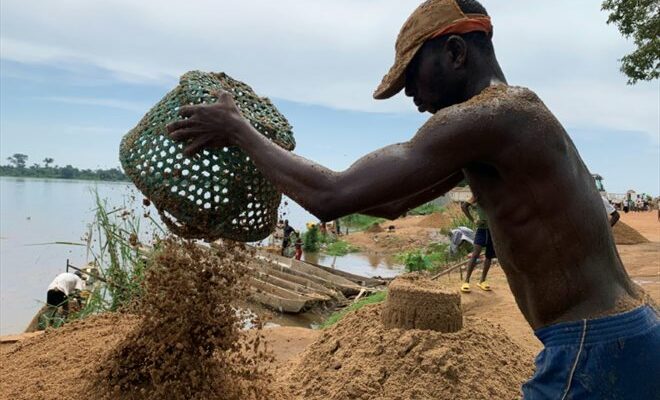Odilon Salima empties a basket of sand collected from the Oubangui river, in Bangui on November 8, 2023 (AFP/Annela NIAMOLO)
From dawn, muscular figures bustle near the canoes on the banks of the Oubangui River in the capital of the Central African Republic. Sand fishermen in Bangui risk their lives and their health, in this country among the poorest in the world, for this essential material in construction.
Armed with their paddles, their shovels and a precious bucket specially woven to retain only the sand, Odilon Salima and a friend sing to give themselves courage before the work.
“Underwater, I have the bucket that I have to fill and my colleague is responsible for loading the canoe with the sand, until reaching the requested quantity,” explains the 36-year-old fisherman who sometimes sinks to the bottom. three meters deep to harvest up to 35 kilos.
-Feed your family-
“Every day we risk our lives to feed our families,” whispers this father of two, who has been in the profession for six years.
He earns 10,000 FCFA per day, the equivalent of 15 euros, and half is spent on renting his canoe. But the average for divers is more like 7,000 francs (10.5 euros) for 12-hour days of work.
Even though his income is twice the average in the country, Odilon suffers. “I save part to pay for the children’s schooling and take care of my family,” confides the diver.

Odilon Salima carries a basket filled with sand collected from the Oubangui River, in Bagui on November 8, 2023 (AFP/Annela NIAMOLO)
The UN estimated that in 2023, more than half of the population would not have enough to eat and 56% would depend on humanitarian aid in the Central African Republic, ranked among the four least developed countries in the world.
Odilon complains of “hearing problems, headaches, back aches, even lungs and respiratory problems”, “but our health is the least of our worries”, says Odilon, adding: “with our expenses at home house, there is almost nothing left to consult a good doctor and buy medicines.
“Diving with repetitive and intense movements can lead to joint injuries or muscle damage,” explains Doctor Max-Benjamin Bagaza, from the Bangui general hospital, about the rare sand fishermen who resign themselves to consulting him. .
The frequent threat of drowning also looms over these divers who have neither life jackets nor oxygen bottles. But no statistics are available for this informal sector profession.
“Once, with the violent wind, the canoe overturned, (…) one of our colleagues, unfortunately, died of drowning,” recalls Odilon Salima.
-Unemployment-
Sand fishermen are not unaware of the risk but, in a country where 71% of the population lives below the poverty line (with less than 2 euros per day), according to the World Bank, they are attracted by the promise of remuneration. higher than average.
Most were unemployed before accepting the risks. For Janet Botsilia, it was 10 years ago. “We are in a country where finding work is almost impossible, it is worse for us who are without a diploma,” says this 42-year-old man.

Saturnin Yenzia loads sand collected from the Oubangui river onto his canoe, in Bangui on November 8, 2023 (AFP/Annela NIAMOLO)
Formerly a diver, he is today president of the Association of Sand Fishermen and owner of 14 canoes which he rents.
“It is thanks to this profession that all of us here, including the young people who work for me, manage to support our families” affirms the entrepreneur.
To guarantee the safety of divers, this sector must enter the formal economy, as economist Didace Sabone explains. But “to make it formal, you need heavy equipment and machinery” and “a lot of resources”, he tempers.
Sand, like everywhere else in the world, is an essential material in the building and public works industry: mixed with cement, it is used in particular to make concrete blocks and concrete.
Bangui, with its million inhabitants, continues to expand and construction sites are multiplying, demand is strong. Entrepreneurs spend 30,000 FCFA (45 euros) for 8 m3 of Oubangui sand.

Odilon Salima empties his basket filled with sand collected from the Oubangui river, in Bngui on November 8, 2023 (AFP/Annela NIAMOLO)
The Central African Republic does not import sand, it draws it from the Oubangui and its tributaries in other cities such as Bangui, or from quarries.
This Central African country was bloodied by yet another civil war which began in 2013. It has decreased in intensity since 2018 to transform into guerrilla warfare in the countryside and the capital is, for the moment, relatively peaceful.
© 2024 AFP
Did you like this article ? Share it with your friends using the buttons below.




